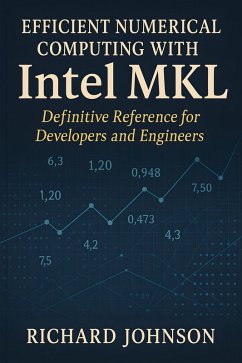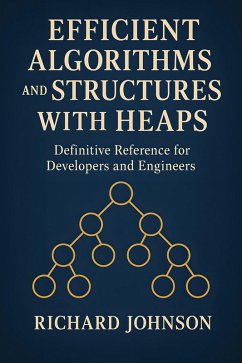
Efficient ETL Systems Design (eBook, ePUB)
Definitive Reference for Developers and Engineers

PAYBACK Punkte
0 °P sammeln!
"Efficient ETL Systems Design" "Efficient ETL Systems Design" is a comprehensive and authoritative guide to the architecture, implementation, and optimization of Extract, Transform, Load (ETL) systems for data-driven organizations. This book systematically explores the evolution of ETL, from early batch processing to modern, event-driven, and cloud-native paradigms, illuminating foundational principles such as modularity, maintainability, and scalability. Readers are introduced to advanced topics including state management, metadata handling, strategic trade-offs between ETL and ELT, and the i...
"Efficient ETL Systems Design"
"Efficient ETL Systems Design" is a comprehensive and authoritative guide to the architecture, implementation, and optimization of Extract, Transform, Load (ETL) systems for data-driven organizations. This book systematically explores the evolution of ETL, from early batch processing to modern, event-driven, and cloud-native paradigms, illuminating foundational principles such as modularity, maintainability, and scalability. Readers are introduced to advanced topics including state management, metadata handling, strategic trade-offs between ETL and ELT, and the integration of both legacy and emerging data sources.
Through detailed chapters, the book navigates cutting-edge extraction and transformation strategies-including scalable, parallel, and real-time pipelines-while delving into performance optimization, data quality, error handling, and schema evolution. It covers the intricacies of high-efficiency data loading, reliability, and fault tolerance, offering proven techniques for maximizing throughput, ensuring data consistency, and implementing robust disaster recovery. Special attention is given to the orchestration, automation, and monitoring of complex ETL workflows, embracing best practices across scheduling, resource management, DevOps integration, and operational observability.
Security, compliance, and data governance form a critical axis of the book, alongside practical guidance for adopting cloud-native, serverless, and containerized ETL frameworks. The final chapters extend into future-facing topics such as DataOps, machine learning pipelines, streaming-first architectures, and the impact of data mesh and decentralized ETL. "Efficient ETL Systems Design" equips data engineers, architects, and technical leaders with the tools, frameworks, and strategies required to build resilient, scalable, and future-proof data integration solutions in a rapidly evolving landscape.
"Efficient ETL Systems Design" is a comprehensive and authoritative guide to the architecture, implementation, and optimization of Extract, Transform, Load (ETL) systems for data-driven organizations. This book systematically explores the evolution of ETL, from early batch processing to modern, event-driven, and cloud-native paradigms, illuminating foundational principles such as modularity, maintainability, and scalability. Readers are introduced to advanced topics including state management, metadata handling, strategic trade-offs between ETL and ELT, and the integration of both legacy and emerging data sources.
Through detailed chapters, the book navigates cutting-edge extraction and transformation strategies-including scalable, parallel, and real-time pipelines-while delving into performance optimization, data quality, error handling, and schema evolution. It covers the intricacies of high-efficiency data loading, reliability, and fault tolerance, offering proven techniques for maximizing throughput, ensuring data consistency, and implementing robust disaster recovery. Special attention is given to the orchestration, automation, and monitoring of complex ETL workflows, embracing best practices across scheduling, resource management, DevOps integration, and operational observability.
Security, compliance, and data governance form a critical axis of the book, alongside practical guidance for adopting cloud-native, serverless, and containerized ETL frameworks. The final chapters extend into future-facing topics such as DataOps, machine learning pipelines, streaming-first architectures, and the impact of data mesh and decentralized ETL. "Efficient ETL Systems Design" equips data engineers, architects, and technical leaders with the tools, frameworks, and strategies required to build resilient, scalable, and future-proof data integration solutions in a rapidly evolving landscape.
Dieser Download kann aus rechtlichen Gründen nur mit Rechnungsadresse in A, B, BG, CY, CZ, D, DK, EW, E, FIN, F, GR, H, IRL, I, LT, L, LR, M, NL, PL, P, R, S, SLO, SK ausgeliefert werden.













